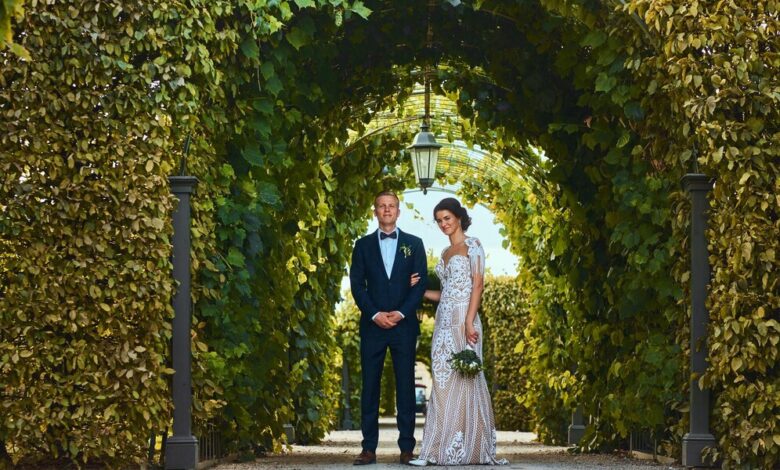Sustainable Vows: How to Plan an Environment-Friendly Wedding with Ease?

In an era where environmental consciousness is becoming increasingly crucial, couples are seeking ways to celebrate their love while minimizing their ecological footprint.
Planning an environment-friendly wedding not only contributes to a healthier planet but also allows couples to create unique and meaningful experiences for themselves and their guests.
This article explores ten essential aspects of planning a sustainable wedding, offering practical tips and ideas to help couples embark on their eco-friendly journey.
1. Choosing the Right Venue
Selecting a wedding venue is one of the first and most significant decisions in planning a sustainable wedding.
Opt for locations that prioritize eco-friendly practices, such as those with green certifications, energy-efficient facilities, and waste reduction initiatives.
Outdoor venues, like botanical gardens or farms, often provide a natural and stunning backdrop, eliminating the need for excessive decorations and reducing the overall environmental impact.
2. Eco-Conscious Invitations
Traditional wedding invitations can contribute to significant paper waste. To minimize environmental impact, consider digital invitations or opt for recycled and biodegradable paper.
Include information on eco-friendly practices in your invitation, encouraging guests to participate in your commitment to sustainability.
Additionally, consider incorporating seed paper into your invitations – a unique touch that allows guests to plant the invitation and watch wildflowers bloom.
3. Thoughtful Attire Choices
Sustainable fashion is gaining popularity, and weddings are no exception. Choose wedding attire made from organic fabrics, or consider buying a second-hand wedding dress or suit.
Another option is to select outfits that can be worn again for different occasions, ensuring they don’t end up in the back of the closet after the wedding day.
Encourage bridesmaids and groomsmen to choose outfits they already own or can use for future events, promoting a more sustainable approach to wedding attire.
4. Biodegradable Confetti
Planning an eco-friendly wedding can be both joyful and sustainable, and one way to add a touch of whimsy while keeping it environmentally conscious is by using biodegradable confetti.
Made from natural materials like dried flower petals or recycled paper, biodegradable confetti from Confetti Bee is a perfect choice for eco-conscious couples looking to minimize waste.
Not only does it add a festive atmosphere to the celebration, but it also breaks down easily, leaving no harmful residue behind.

5. Zero-Waste Decorations
Embrace the beauty of minimalism and zero-waste decorations for an eco-friendly wedding. Consider using potted plants or succulents as centerpieces, which can serve as both decorations and wedding favors.
Choose reusable banners, signs, and tablecloths made from sustainable materials, and avoid single-use items such as balloons and confetti.
If you’re feeling crafty, create DIY decorations from recycled materials or repurpose items you already have at home.
6. Green Transportation Options
Transportation is a significant contributor to carbon emissions at weddings, especially if guests are traveling from different locations. Encourage carpooling or provide shuttle services to reduce the number of individual vehicles.
For a unique touch, consider using eco-friendly transportation options such as bicycles or electric vehicles for the bridal party or even for guests to explore the venue.
If the ceremony and reception are at the same location, suggest walking or other low-impact modes of transportation.
7. Energy-Efficient Lighting and Technology
Lighting plays a crucial role in creating a romantic and enchanting atmosphere at weddings. Opt for energy-efficient LED lights or, even better, utilize natural lighting for daytime events.
If your wedding takes place in the evening, consider solar-powered or rechargeable battery-operated lights for outdoor spaces.
Embrace technology for aspects like digital guest books and online RSVPs, reducing the need for excessive paper and streamlining the planning process.

8. Waste Reduction Strategies
Implementing waste reduction strategies is a key component of an environmentally friendly wedding. Provide clearly labeled recycling and compost bins alongside regular trash bins to encourage proper waste disposal.
Choose caterers and vendors who commit to minimizing packaging waste and have a plan for responsibly disposing of any waste generated during the event.
Consider donating decorations and other items to local schools, community centers, or charities after the wedding.
9. Green Wedding Registries
When creating a wedding registry, opt for gifts that align with your commitment to sustainability. Choose items made from eco-friendly materials, such as bamboo kitchenware or organic cotton bedding.
Consider requesting experiences or contributions to a honeymoon fund rather than physical gifts. Some websites even offer eco-conscious registry options, allowing couples to curate a list of items from environmentally responsible brands.
10. Carbon Offsetting and Charitable Donations
While striving to minimize the environmental impact of your wedding, it’s essential to acknowledge that some emissions are inevitable.
Consider carbon offsetting options to neutralize the impact of travel, energy consumption, and other unavoidable aspects of the event.
Additionally, instead of traditional wedding favors, make a charitable donation on behalf of your guests to a cause that resonates with both of you.
This not only supports a meaningful cause but also adds a philanthropic and environmentally conscious element to your celebration.
11. Ethical and Local Catering
Food is a central element of any wedding celebration, and choosing a sustainable catering option can make a significant difference.
Opt for local and organic food to support nearby farmers and reduce the carbon footprint associated with transportation.
Inquire about the caterer’s waste reduction efforts, such as composting and recycling, and choose reusable tableware and utensils to minimize single-use plastics.
Donating leftover food to local charities is another way to make a positive impact on the community.
Conclusion
Planning an environmentally friendly wedding requires thoughtful consideration and a commitment to making sustainable choices at every stage of the process.
By incorporating these ten essential aspects into your wedding planning, you can create a celebration that not only reflects your love for each other but also demonstrates a shared dedication to the well-being of the planet.
From choosing eco-friendly venues to embracing zero-waste decorations, each decision contributes to a more sustainable and memorable wedding experience.
As couples increasingly prioritize sustainability, the wedding industry is evolving to offer a variety of options that allow love to bloom while leaving a smaller ecological footprint.




One Comment